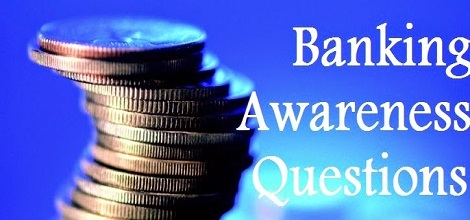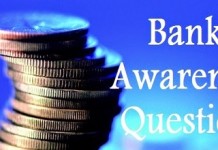Hello Aspirants,
Welcome to Banking Awareness Quiz in AffairsCloud.com. Here we are creating quiz covering important questions which are common for all the bank exams and other competitive exams.
- An ECS transaction gets bounced and you are unable to recover your money from your customer. Under which Act criminal action can be initiated?
A. Negotiable Instrument Act 1881
B. Criminal Procedure Code
C. Payment and Settlement Systems Act 2007
D. Indian Companies Act 1956C. Payment and Settlement Systems Act 2007
Explanation:
Under the Section 25 of Payment and Settlement Systems (PSS) Act, 2007, dishonour of an electronic fund transfer instruction due to insufficiency of funds in the account etc., is an offence punishable with imprisonment or with fine or both, similar to the dishonour of a cheque under the Negotiable Instruments Act 1881. - In which of the following fund transfer mechanisms, can funds be moved from one bank to another and where the transaction is settled instantly without being bunched with any other transaction?
A. RTGS
B. NEFT
C. TT
D. EFTA. RTGS
Explanation:
In RTGS, the beneficiary branches are expected to receive the funds in real time as soon as funds are transferred by the remitting bank. The beneficiary bank has to credit the beneficiary’s account within 30 minutes of receiving the funds transfer message. - A worldwide financial messaging network which exchanges messages between banks and financial institutions is known as _________
A. SWIFT
B. Basel
C. RTGS
D. NEFTA. SWIFT
Explanation:
Society for Worldwide Inter bank Financial Telecommunication code. An internationally-recognized identification code for banks around the world. SWIFT codes are most commonly used for international wire transfers and are comprised of 8 or 11 alphanumeric characters. - Which of the following is not a ‘Money Market Instrument’?
A. Treasury Bills
B. Commercial Paper
C. Certificate of Deposit
D. Equity SharesD. Equity Shares
Explanation:
There are several money market instruments, including treasury bills, commercial paper, bankers’ acceptances, deposits, certificates of deposit, bills of exchange, repurchase agreements, federal funds, and short-lived mortgage-, and asset-backed securities. - When there is a difference between all receipts and expenditure of the Govt. of India, both capital and revenue it is called _______
A. Income Deficit
B. Fiscal Deficit
C. Budgetary Deficit
D. None of the AboveC. Budgetary Deficit
Explanation:
A budget deficit occurs whenever a government spends more than it makes, which is nearly every year.Budgetary deficit is the difference between all receipts and expenses in both revenue and capital account of the government. - With reference to a cheque which of the following is the ‘drawee bank’ ?
A. The bank that collects the cheque
B. The payee’s bank
C. The endorser’s bank
D. The bank upon which the cheque is drawnD. The bank upon which the cheque is drawn
Explanation:
Drawee is a legal and banking term used to describe the party that has been directed by the depositor to pay a certain sum of money to the person presenting the check or draft. A typical example is if you are cashing a paycheck. - Banks issue a letter to beneficiary on behalf of its constituents like guarantee for making payment on their behalf on fulfilment of its terms and conditions. What is this arrangement known in banking context?
A. Line of Credit
B. Loan to Client
C. Loan on Credit
D. Letter of CreditD. Letter of Credit
Explanation:
A letter issued by a bank to another bank (especially one in a different country) to serve as a guarantee for payments made to a specified person under specified conditions. - When a Bank provides a loan for purchase of white goods, it is categorised as _____________
A. Consumption loan
B. White Goods loan
C. Consumer Durable loan
D. Working CapitalC. Consumer Durable loan
Explanation:
Consumer Durable loan is a finance option for purchase of (White Goods) household items like Washing Machines, Refrigerators, AC, LED, LCD, Microwaves etc. - Fixed Deposits and Recurring Deposits are _________
A. repayable after an agreed period.
B. repayable on demand.
C. not repayable.
D. repayable on demand or after an agreed period as per bank’s choice.D. repayable on demand or after an agreed period as per bank’s choice.
Explanation:
A fixed deposit (FD) is a financial instrument provided by banks which provides investors with a higher rate of interest than a regular savings account, until the given maturity date.And Recurring Deposit is a special kind of Term Deposit offered by banks in India which help people with regular incomes to deposit a fixed amount every month into their Recurring Deposit account and earn interest at the rate applicable to Fixed Deposits. - What is the fullform of ‘FSDC’ which is used in financial sectors?
A. Financial Security and Development Council
B. Financial Stability and Development Council
C. Fiscal Security and Development Council
D. Fiscal Stability and Development CouncilB. Financial Stability and Development Council
Explanation:
Financial Stability and Development Council is an apex-level body constituted by the government of India.
Chairperson: The Union Finance Minister of India
Members: Governor Reserve Bank of India (RBl), Finance Secretary and/ or Secretary, Department of Economic Affairs (DEA), Secretary, Department of Financial Services (DFS), Chief Economic Advisor, Ministry of Finance, Chairman, Securities and Exchange Board of India (SEBI), Chairman, Insurance Regulatory and Development Authority (IRDA), Chairman, Pension Fund Regulatory and Development Authority (PFRDA), Chairman, Forward Markets Commission (FMC), Additional Secretary, Ministry of Finance, DEA, will be the Secretary of the Council.
AffairsCloud Recommends Oliveboard Mock Test
AffairsCloud Ebook - Support Us to Grow
Govt Jobs by Category
Bank Jobs Notification



